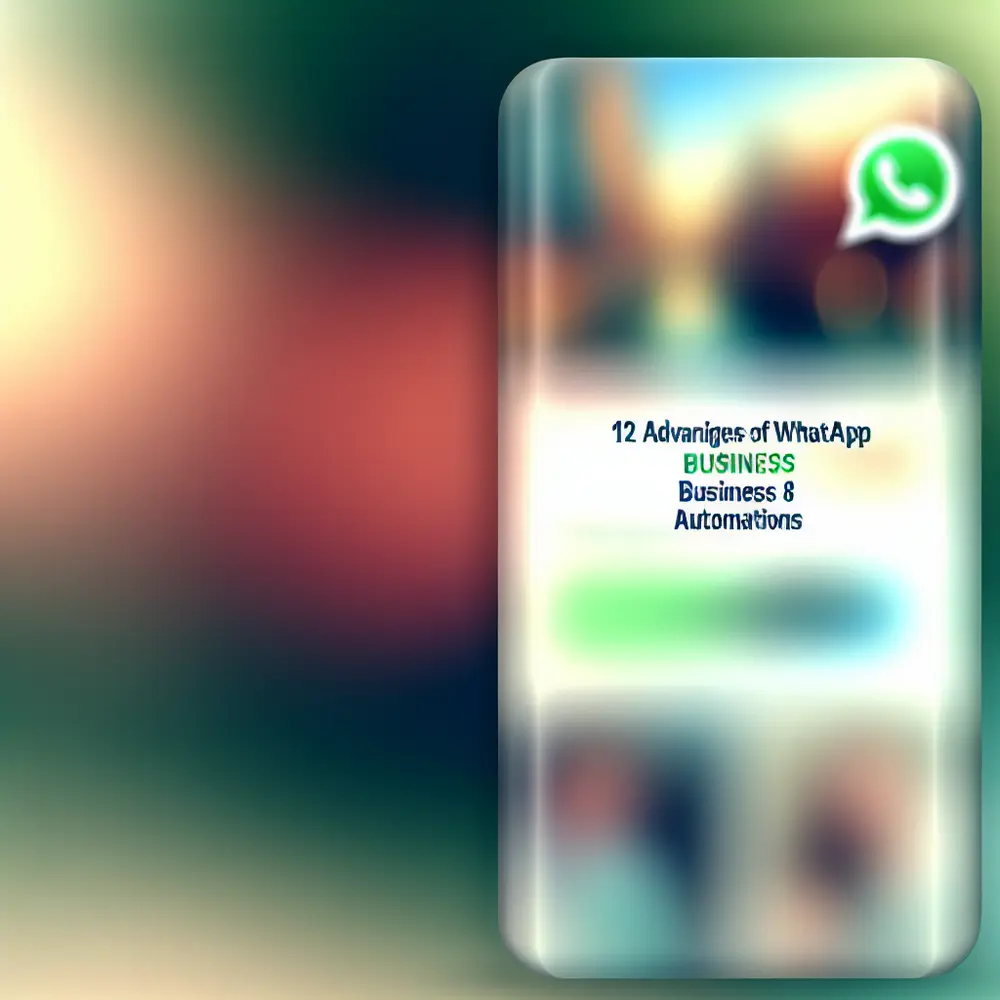In the rapidly evolving digital landscape, businesses are continually seeking innovative ways to engage with customers. One of the most transformative tools in this arena is WhatsApp Business, which reshapes traditional communication methods by offering a platform tailored specifically for enterprises. This application streamlines communication, allowing businesses to connect with clients on a more personal level while maintaining professionalism throughout the interaction. Its array of features—including business profiles, automated messages, and quick replies—equips organizations with the means to enhance customer experience and foster strong relationships.
As companies navigate the complexities of customer engagement, WhatsApp Business emerges as a vital tool that not only facilitates efficient communication but also opens doors for heightened engagement and conversions. Its growing popularity underscores the necessity for businesses to establish direct, open lines of communication with their customers. By leveraging WhatsApp Business, enterprises can respond promptly to inquiries, provide real-time support, and improve response times. Consequently, this not only boosts customer satisfaction but also nurtures brand loyalty among consumers who value responsiveness.
Furthermore, the automation capabilities of WhatsApp Business are particularly appealing for businesses looking to optimize their operations. By employing automated greetings, quick replies to frequently asked questions, and scheduled messages, companies can enhance their efficiency and productivity. This approach allows staff to focus on more complex issues while ensuring that customers receive immediate feedback, even outside of regular working hours. As organizations look to modernize their workflows and improve customer service quality, understanding the multifaceted benefits of WhatsApp Business automation is essential for sustainable growth.
Transforming Customer Engagement with WhatsApp Business
WhatsApp Business is transforming the way companies engage with their customers, offering a robust platform tailored to meet the unique needs of businesses. Designed explicitly for enterprises, this application facilitates seamless communication by enabling companies to connect with clients on a personal level while maintaining professionalism. With features such as business profiles, automated messages, quick replies, and the ability to manage customer interactions efficiently, WhatsApp Business streamlines communication processes and enhances overall customer experience.
Incorporating WhatsApp Business into your business strategy not only fosters stronger relationships with clients but also opens opportunities for increased engagement and conversions. The platform has rapidly gained popularity, becoming an essential tool for businesses that recognize the need for a direct line of communication with their customers. By leveraging WhatsApp Business, companies can respond to customer inquiries swiftly, provide real-time support, and reduce response times, which ultimately leads to greater customer satisfaction and loyalty.
The automation capabilities offered by WhatsApp Business are particularly noteworthy. With features that allow for automated greetings, quick replies to frequently asked questions, and scheduled messages, businesses can significantly enhance their operational efficiency. This business automation not only frees up time for staff to focus on more complex issues but also ensures that customers receive prompt responses, even outside of regular business hours. The ability to automate customer interactions leads to higher productivity levels and a more organized approach to customer service.
Utilizing WhatsApp Business as part of your marketing and sales efforts can further amplify its impact. Businesses can send targeted promotions, share updates, and provide valuable content directly to customers, which helps in maintaining engagement and driving sales. In today’s fast-paced digital landscape, having a presence on a platform that customers already use daily is crucial. Taking advantage of WhatsApp Business can set your company apart, making communication more accessible, efficient, and tailored to the needs of both the business and its clientele.
The Importance of Automation in WhatsApp Business
Automation has become a cornerstone for businesses looking to maintain competitiveness in today’s fast-paced environment, and WhatsApp Business stands out as an essential tool in this arena. With the increasing reliance on digital communication, understanding the importance of business automation via WhatsApp Business can significantly enhance a company’s operational efficiency. Automation not only streamlines communication with customers but also fosters a more structured business strategy, allowing teams to focus on high-impact activities while routine tasks are managed seamlessly.
One of the key benefits of implementing automation within WhatsApp Business is the ability to improve customer service quality. Automated responses for frequently asked questions, order confirmations, and appointment reminders ensure that customers receive immediate feedback, which is critical for satisfaction and retention. This instant communication builds trust and demonstrates a commitment to customer service, which can differentiate a business in saturated marketplaces. Moreover, by providing quick responses, businesses minimize the chances of losing potential sales due to delayed interactions.
Additionally, business automation can drastically enhance the analytical capabilities of WhatsApp Business users. By integrating automation tools, companies can gather and analyze data pertaining to customer interactions, preferences, and behaviors. This information enables businesses to tailor their products, services, and marketing strategies more effectively, leading to improved customer engagement and higher conversion rates. Understanding how leveraging analytics through automation contributes to strategic decision-making is crucial for business success.
Furthermore, automation in WhatsApp Business can significantly optimize operational processes. By deploying chatbots and automated workflows, businesses can reduce the workload on customer service teams, leading to increased productivity and lower operational costs. This allows team members to devote more time and energy to complex inquiries and high-value customer interactions that require a personal touch. In addition to fostering efficiency, such automation strategies contribute to a positive brand image and customer loyalty, further enhancing the long-term success of the business.
Setting Up Your WhatsApp Business Account
Setting up your WhatsApp Business account is a crucial step for any business looking to enhance its communication and streamline customer interactions. To get started, first, download the WhatsApp Business app from the Google Play Store or Apple App Store. Once installed, open the app and accept the terms and conditions. You’ll then need to verify your business phone number, which can be a landline or mobile. This verification process is essential as it links the account to your business identity, helping build trust with potential customers.
After verification, you’ll be prompted to set up your business profile. This is where you’ll input important information such as your business name, category, address, description, and website link. It’s advisable to choose a business name that reflects your brand and is easy to recall. You should also upload a business logo as your profile picture to enhance brand recognition. Completing your business profile not only provides essential information to customers but also establishes credibility and professionalism.
Next, take advantage of the features offered by WhatsApp Business to enhance your communication strategy. One of the key features is the automated messaging capabilities that include welcome messages, quick replies, and away messages. Setting up a welcome message allows you to greet customers as soon as they contact your business, providing them with initial information and setting the tone for future interactions. Quick replies can save time by allowing you to respond to frequently asked questions with pre-defined messages, which is crucial for improving efficiency.
Finally, integrating WhatsApp Business with marketing and sales strategies can significantly enhance your overall business operations. By utilizing features like broadcast lists, you can send updates, promotions, and announcements to multiple customers at once. This not only saves time but also helps to increase engagement levels with your audience. Additionally, consider the benefits of using WhatsApp Business in conjunction with other customer relationship management (CRM) tools. This integration helps track customer interactions, gathers insights, and ultimately contributes to a more informed business strategy that drives sales and improves customer service.
Leveraging Automation Tools for Enhanced Customer Service
Leveraging automation tools for WhatsApp Business is essential for optimizing communication, enhancing customer service, and maximizing sales opportunities. The integration of automation within this platform allows businesses to streamline their processes, ensuring that customer inquiries are met promptly and efficiently. By automating responses, businesses can significantly reduce response times, providing 24/7 support that caters to various time zones and customer availability.
One of the most impactful features of WhatsApp Business automation is the ability to set up automated replies for frequently asked questions. Businesses can program responses to common inquiries such as operating hours, product availability, and pricing information. This feature not only saves valuable time for customer service teams but also empowers customers to receive instant solutions, thereby improving customer satisfaction and engagement. Additionally, automated welcome messages create a warm introduction for new customers, establishing a positive first impression.
Moreover, integrating WhatsApp Business with other automation tools and customer relationship management (CRM) systems can enhance the overall customer experience. By capturing customer data and preferences, businesses can tailor their interactions, making them more relevant and personalized. Automated follow-ups, reminders about abandoned carts, and notifications about special promotions or events can be effortlessly sent to customers. This level of personalization not only drives engagement but also significantly boosts conversion rates.
Lastly, effective tracking and analysis of automated interactions can provide critical insights into customer behavior and preferences. Utilizing analytics tools available within WhatsApp Business allows business owners and managers to monitor the effectiveness of their automation strategies. By understanding which automated messages yield the best results, businesses can refine their approach and continuously improve their communication strategies in an increasingly competitive landscape.
Creating Effective Business Strategies with WhatsApp Business
Creating effective business strategies using WhatsApp Business can significantly enhance operational efficiency and customer engagement. As one of the most widely used communication platforms, WhatsApp Business allows companies to establish a direct link with their customers, thus transforming the way they interact. The application is designed with business-centric features, allowing for streamlined communication that keeps your audience engaged and informed.
To develop an impactful strategy, businesses should leverage the messaging capabilities of WhatsApp Business. Crafting compelling messages tailored to specific customer segments ensures that communications resonate with their interests and needs. Utilizing features like automated replies can enhance responsiveness, allowing businesses to address inquiries promptly while managing customer expectations efficiently. This form of business automation not only increases customer satisfaction but also frees up time for staff to focus on more complex tasks.
Incorporating multimedia content such as images, videos, and product catalogs within conversations can further elevate customer engagement. Showcasing products dynamically within chat can enhance the customer shopping experience, turning interactions into transaction opportunities. Businesses can also conduct surveys or gather feedback directly through WhatsApp Business, providing valuable insights into customer preferences, which can inform future marketing strategies and product developments.
To optimize automation, integrating WhatsApp Business with existing customer relationship management (CRM) systems can help streamline workflows. This setup allows for better tracking of customer interactions and ensures that businesses can utilize automated reminders and notification systems effectively. It facilitates consistent message delivery while allowing for personalization based on customer data. By adopting these strategies, companies can enhance their overall business automation efforts, making WhatsApp Business an integral component of their comprehensive business strategy.
Case Studies: Successful Implementation of WhatsApp Business Automation
Case studies highlighting the successful implementation of WhatsApp Business automation provide valuable insights into how businesses can leverage this powerful tool to enhance customer engagement, streamline operations, and boost profits. Companies across various sectors have adopted WhatsApp Business automation to transform their customer service experience, resulting in greater efficiency and satisfaction.
For instance, a retail company integrated WhatsApp Business automation into its customer service strategy, allowing customers to place orders, track shipments, and receive instant support. By utilizing chatbots for common inquiries, the company significantly reduced response times and improved customer satisfaction ratings. This automation not only freed up valuable staff resources but also ensured that customers received timely interactions, thereby enhancing the overall user experience. Sales increased by 30% within three months, as customers appreciated the ease of communication and quick resolutions.
In the travel sector, a travel agency effectively utilized WhatsApp Business automation to streamline booking processes and provide real-time updates to clients. By automating confirmations, itinerary changes, and travel alerts, the agency minimized customer confusion and proactive communication was enhanced. This not only led to a reduction in customer service calls but also increased repeat bookings as clients felt well-informed and valued. The agency reported a 25% increase in customer retention rates within the first half of the year.
Furthermore, a service-based business, such as a dental practice, implemented WhatsApp Business automation to manage appointment scheduling and patient reminders. By automating these messages, the practice was able to decrease no-show rates by 40%. Patients received timely reminders about upcoming appointments, which improved attendance and overall satisfaction. The dental practice also saw a rise in new patients, as existing clients shared their positive experiences with automated communication on social media.
Best Practices for Managing Customer Interactions on WhatsApp Business
Efficiently managing customer interactions on WhatsApp Business involves implementing best practices that enhance communication and streamline operations. One fundamental strategy is establishing clear communication guidelines. Businesses should define response times, create standard operating procedures for different types of inquiries, and ensure that all team members are trained to maintain a consistent tone and style. This creates a cohesive customer experience, where clients feel valued and understood, thus building trust and rapport between the business and its clientele.
Automation is central to optimizing interactions on WhatsApp Business. Utilizing automated replies can significantly reduce the volume of incoming inquiries while still providing timely responses. Setting up FAQs in an automated response system allows customers to get immediate assistance for common queries, freeing up staff for more complex issues. Additionally, businesses can automate notifications and reminders for appointments, follow-ups, or promotions, which not only saves time but keeps customers engaged.
Segmenting customer interactions is another best practice that aids in more personalized communication. By categorizing customers based on their previous interactions, preferences, or purchasing behavior, businesses can tailor their messages to meet individual needs and expectations. This personalization can be enhanced through leveraging WhatsApp Business tools, such as labels, which help in organizing contacts and tracking customer journeys. With targeted communications, companies can improve engagement rates and foster long-term customer relationships.
Finally, measurement and analysis are crucial components in managing customer interactions effectively. Businesses should regularly review metrics like response times, message open rates, and customer feedback to assess the performance of their WhatsApp Business strategy. Implementing KPIs (Key Performance Indicators) allows for continuous improvement in customer service efforts. Gathering insights from customer interactions can guide future automation efforts and communication strategies, ensuring the business stays aligned with customer expectations and enhances overall satisfaction.
Challenges of Automation in WhatsApp Business
Automation in WhatsApp Business brings numerous benefits but is not without its challenges. Identifying these obstacles is crucial for business owners, sales managers, and customer service professionals to implement effective solutions that enhance their operational efficiency and customer engagement.
A common challenge in WhatsApp Business automation is managing large volumes of messages effectively. Businesses may struggle with the sheer number of incoming queries, leading to delays in response times. To tackle this, employing automated responses for frequently asked questions can significantly reduce the workload on staff. By programming quick replies for common inquiries such as price lists, operating hours, and order confirmations, companies can provide immediate assistance while ensuring customers feel attended to, even during peak times.
Another issue frequently encountered is personalization in automated messages. Businesses often worry that automation may lead to robotic, impersonal interactions with customers. The solution lies in blending automation with personalized elements. For instance, using customer data to address recipients by name or tailoring responses based on previous interactions can enhance the user experience. This strategy allows businesses to maintain a personal touch while enjoying the efficiency of automated systems, ultimately supporting a more effective business strategy.
Integration with existing customer relationship management (CRM) systems also poses a significant hurdle. Many businesses find it challenging to synchronize their WhatsApp Business automation with their CRM tools, leading to disjointed customer data and communication strategies. A practical response to this challenge is to utilize APIs that facilitate seamless integration between platforms. By ensuring that all customer interactions are logged and updated in real-time, businesses can create a comprehensive overview of customer journeys, enabling more informed decision-making and improved service delivery.
Lastly, one of the most critical challenges is tracking the impact of automation efforts. Without a clear understanding of how automation affects customer satisfaction and sales, it can be difficult to justify the investment. Implementing analytics tools within the WhatsApp Business framework can offer valuable insights into customer interactions and engagement levels. By regularly reviewing these metrics, businesses can fine-tune their automation strategies to continually enhance effectiveness and ensure a positive ROI.
Conclusion: The Future of WhatsApp Business Automation
Automation is revolutionizing how businesses interact with their customers, and WhatsApp Business stands at the forefront of this transformation. As we explored throughout this guide, the integration of automation into WhatsApp Business is not merely a trend but a fundamental shift in enhancing customer engagement and operational efficiency. With more businesses recognizing the value of real-time communication, leveraging automation within this platform can significantly improve response times and customer satisfaction levels.
The future of WhatsApp Business automation looks promising, with continuous advancements in AI and machine learning capable of streamlining interactions. Businesses can expect enhanced capabilities for managing customer inquiries, processing orders, and providing personalized experiences at scale. By utilizing intelligent chatbots and automated response systems, organizations can ensure that their customers receive immediate assistance—day or night—creating a seamless experience that is increasingly expected in today’s fast-paced market.
Moreover, WhatsApp Business automation helps companies analyze customer interactions and gather invaluable data. This data can inform business strategies by identifying trends in customer preferences and behaviors. By harnessing these insights, businesses can refine their marketing tactics, improve product offerings, and ultimately drive higher conversion rates.
As the digital landscape evolves, adopting a robust automation strategy within WhatsApp Business will not only give businesses a competitive edge but also prepare them for future challenges in customer relations. Embracing these changes can yield significant benefits, positioning businesses as proactive leaders within their industries, ready to meet the expectations of a digitally-savvy customer base. Therefore, investing in WhatsApp Business automation is not just an operational decision; it is a critical step in implementing a comprehensive business strategy aimed at long-term success.
The CRM for WhatsApp is essential for businesses that wish to grow and enhance their interaction with clients effectively.







